|
Books Should Be Free Loyal Books Free Public Domain Audiobooks & eBook Downloads |
|
|
Books Should Be Free Loyal Books Free Public Domain Audiobooks & eBook Downloads |
|
Religion |
|---|
|
Book type:
Sort by:
View by:
|
By: John Bunyan (1628-1688) | |
|---|---|
 The Jerusalem Sinner Saved; or, Good News for the Vilest of Men
The Jerusalem Sinner Saved; or, Good News for the Vilest of Men
| |
By: John Milton (1608-1674) | |
|---|---|
 Paradise Regained
Paradise Regained
Paradise Regained is a poem by the 17th century English poet John Milton, published in 1671. It is connected by name to his earlier and more famous epic poem Paradise Lost, with which it shares similar theological themes. Based on the Gospel of Luke’s version of the Temptation of Christ, Paradise Regained is more thoughtful in writing style, and thrives upon the imagery of Jesus’ perfection in contrast to the shame of Satan. | |
By: Andrew Lang (1844-1912) | |
|---|---|
 Myth, Ritual and Religion — Volume 1
Myth, Ritual and Religion — Volume 1
| |
 Tales of Troy: Ulysses the Sacker of Cities
Tales of Troy: Ulysses the Sacker of Cities
These are short stories about the life of Ulysses, the stealing of Helen, Paris, battles, Trojan horses, and more! | |
 John Knox and the Reformation
John Knox and the Reformation
| |
 Custom and Myth
Custom and Myth
CUSTOM AND MYTHINTRODUCTION.Though some of the essays in this volume have appeared in various serials, the majority of them were written expressly for their present purpose, and they are now arranged in a designed order. During some years of study of Greek, Indian, and savage mythologies, I have become more and more impressed with a sense of the inadequacy of the prevalent method of comparative mythology. That method is based on the belief that myths are the result of a disease of language, as the pearl is the result of a disease of the oyster... | |
By: Saint Ambrose (337/340-397) | |
|---|---|
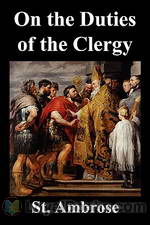 On the Duties of the Clergy
On the Duties of the Clergy
Aurelius Ambrosius was a fourth century cleric who rose to become the Archbishop of Milan in 374 AD. His father was a powerful Roman general and the prefect of Gaul. His brother and sister were also consecrated as saints by the Catholic Church. As an infant, a swarm of bees settled over his face and flew away without harming the baby, but left behind a drop of honey and this was seen as a sign of his future eloquence and bees are often painted in his portraits as his symbols. Ambrosius (or Ambrose as he is referred to in English) was a highly learned man, well versed in Latin and Greek, theology and many other subjects... | |
 Concerning Virgins
Concerning Virgins
Concerning Virgins (De Virginibus) is a series of letters, compiled into three “books,” St. Ambrose wrote to his sister, Manellia, These, perhaps Ambrose’s earliest writings, were written in 377 CE. Written in a rather light-handed non-technical style they appear as ethical guides to women who are contemplating entering nunneries. More importantly, they set the tone for Ambrose’s later writing on ethics. Concerning Virgins was referred to by other patristic writers including St. Jerome, St Augustine and Cassian, and are now included in the extra-biblical cannon of the early church fathers. | |
By: Robert Michael Ballantyne (1825-1894) | |
|---|---|
 My Doggie and I
My Doggie and I
This story surrounds a child waif, a young woman, a young gentleman doctor, and an elderly lady. This tale unfolds the story of a bond that brings these unlikely friends together and merges their separate paths of life into one common path. The bond is "Dumps", or "Pompey", the "doggie". With many twists, turns, and uncertainties, the ending may surprise the reader. All's well that ends well in this doggie "tail". (Introduction by Allyson Hester) | |
By: Gustave Flaubert (1821-1880) | |
|---|---|
 The Temptation of St. Antony or A Revelation of the Soul
The Temptation of St. Antony or A Revelation of the Soul
| |
By: John Donne (1572-1631) | |
|---|---|
 Holy Sonnets
Holy Sonnets
John Donne (1572 – March 31, 1631) was a Jacobean poet and preacher, representative of the metaphysical poets of the period. His works, notable for their realistic and sensual style, include sonnets, love poetry, religious poems, Latin translations, epigrams, elegies, songs, satires and sermons. His poetry is noted for its vibrancy of language and immediacy of metaphor, compared with that of his contemporaries. Towards the end of his life Donne wrote works that challenged death, and the fear that it inspired in many men, on the grounds of his belief that those who die are sent to Heaven to live eternally... | |
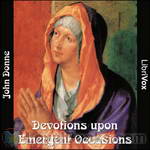 Devotions upon Emergent Occasions
Devotions upon Emergent Occasions
Devotions upon Emergent Occasions is a 1624 prose work by the English writer John Donne. It is a series of reflections that were written as Donne recovered from a serious illness, believed to be either typhus or relapsing fever. (Donne does not clearly identify the disease in his text.) The work consists of twenty-three parts describing each stage of the sickness. Each part is further divided into a Meditation, an Expostulation, and a Prayer. The seventeenth meditation is perhaps the best-known part of the work... | |
 A Selection of Divine Poems
A Selection of Divine Poems
John Donne was an English Jacobean preacher, sometime lawyer, later in life a Member of Parliament and Royal Chaplain. Marrying for love against the wishes of his influential father-in-law; Donne's career was cast into shadow: forcing him to support his wife, Anne, as best he might under a specter of unforgiving penury. Despite such hardships - perhaps because of them - Donne's writings demonstrate a mastery of poetry layered with metaphysical meaning and mystery: which continues to delight and challenge modern-day readers... | |
By: Saint Augustine of Hippo (354-430) | |
|---|---|
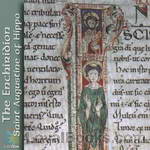 The Enchiridion
The Enchiridion
The Enchiridion, Manual, or Handbook of Augustine of Hippo is alternatively titled, “Faith, Hope, and Love”. The Enchiridion is a compact treatise on Christian piety, written in response to a request by an otherwise unknown person, named Laurentis, shortly after the death of Saint Jerome in 420. It is intended as a model for Christian instruction or catechesis. – As the title indicates, the work is organized according to the three graces necessary for the Christian worship of God: Faith, Hope and Love... | |
By: Samuel Taylor Coleridge (1772-1834) | |
|---|---|
 Confessions of an Inquiring Spirit and Some Miscellaneous Pieces
Confessions of an Inquiring Spirit and Some Miscellaneous Pieces
| |
By: Andrew Murray (1828-1917) | |
|---|---|
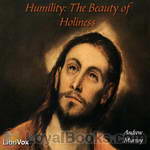 Humility : The Beauty of Holiness
Humility : The Beauty of Holiness
A book on the all importance of humility, how Jesus was humble, and how we also can become humble. Murray wrote “Without humility, there can be no true abiding in God’s presence or experience of His favor and the power of His spirit. Without it there can be no abiding faith or love or joy or strength.” | |
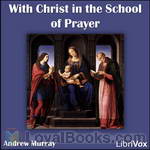 With Christ in the School of Prayer
With Christ in the School of Prayer
It is under a deep impression that the place and power of prayer in the Christian life is too little understood, that this book has been written. I feel sure that as long as we look on prayer chiefly as the means of maintaining our own Christian life, we shall not know fully what it is meant to be. But when we learn to regard it as the highest part of the work entrusted to us, the root and strength of all other work, we shall see that there is nothing that we so need to study and practise as the art of praying aright... | |
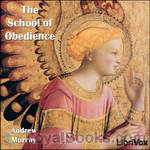 The School of Obedience
The School of Obedience
Andrew Murray describes the necessity and benefits of absolute obedience to God. He goes on to explain the way to achieve this level of obedience, which is required of all believers, and attainable through God’s provision. | |
 The Ministry of Intercession A Plea for More Prayer
The Ministry of Intercession A Plea for More Prayer
| |
 Holy in Christ Thoughts on the Calling of God's Children to be Holy as He is Holy
Holy in Christ Thoughts on the Calling of God's Children to be Holy as He is Holy
In introducing this book, which Andrew Murray sub-titled “Thoughts on the Calling of God’s Children to Be Holy as He is Holy”, I can do no better than to quote from the author’s own Preface: “It has been my earnest desire that I might be a helper of the faith of my brethren in seeking to trace with them the wondrous revelation of God’s Holiness through the ages as recorded in His blessed Word. It has been my continual prayer that God might use what is written to increase in His children the conviction that we must be holy, the knowledge of how we are to be holy, the joy that we may be holy, the faith that we can be holy... | |
 Lord, Teach Us To Pray
Lord, Teach Us To Pray
| |
 'Jesus Himself'
'Jesus Himself'
Is it possible to be familiar with Jesus, to know the Bible, to be involved in church life, and yet not really know Jesus at all well? Andrew Murray, with his perceptive insights into the church of his day, and indeed of ours too, shows how this is all too often the condition of many believers. In the two essays comprising this book, Murray shows how we can move to a new place in really knowing Jesus, and how the presence of the Lord can become much more real to us. There is a cost, but God always abundantly rewards those who seek Him with their whole heart. | |
By: John Stuart Mill (1806-1873) | |
|---|---|
 Auguste Comte and Positivism
Auguste Comte and Positivism
Part 1 lays out the framework for Positivism as originated in France by Auguste Comte in his Cours de Philosophie Positive. Mill examines the tenets of Comte's movement and alerts us to defects. Part 2 concerns all Comte's writings except the Cours de Philosophie Positive. During Comte's later years he gave up reading newspapers and periodicals to keep his mind pure for higher study. He also became enamored of a certain woman who changed his view of life. Comte turned his philosophy into a religion, with morality the supreme guide. Mill finds that Comte learned to despise science and the intellect, instead substituting his frantic need for the regulation of change. | |
By: Saint Thomas Aquinas (1225-1274) | |
|---|---|
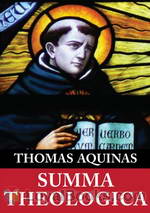 Summa Theologica, Pars Prima
Summa Theologica, Pars Prima
More than nine hundred years after it was first written, this unfinished work of a scholar saint still has the power to move our minds and hearts and set us thinking on the really important questions of life. Summa Theologica or simply the Summa as it is known, was written some time between 1265-74. It is a work that has had a profound and enduring influence on Western thought and literature. Designed to provide answers to Catholic theologians about the teachings of the Church, Thomas Aquinas' book instead goes far beyond its stated purpose... | |
By: Kate Douglas Wiggin | |
|---|---|
 The Old Peabody Pew: A Christmas Romance of a Country Church
The Old Peabody Pew: A Christmas Romance of a Country Church
A sweet, old fashioned Christmas romance set in an old New England meeting house. | |
By: Unknown | |
|---|---|
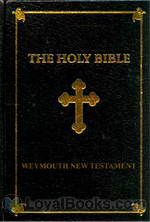 The Bible, Weymouth New Testament (WNT) - Matthew
The Bible, Weymouth New Testament (WNT) - Matthew
The Weymouth New Testament ("WNT"), otherwise known as The New Testament in Modern Speech or The Modern Speech New Testament, is a translation into "modern" English as used in the nineteenth century from the text of The Resultant Greek Testament by Richard Francis Weymouth from the Greek idioms used in it. It was later edited and partly revised by Reverend Ernest Hampden-Cook in London, England. Publishers: Baker and Taylor Company (New York) in 1903 and James Clarke & Co (London) in 1903.Richard Francis Weymouth's popular translation of the New Testament into English was first published in 1903 and has been in print through numerous editions ever since with millions of copies sold... | |